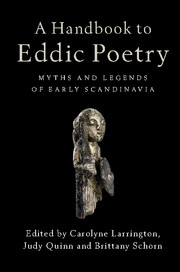Book contents
- Frontmatter
- Contents
- List of illustrations
- List of contributors
- Translations and abbreviations of the titles of eddic poems
- Introduction
- 1 The transmission and preservation of eddic poetry
- 2 Traditions of eddic scholarship
- 3 The editing of eddic poetry
- 4 The dating of eddic poetry
- 5 Eddic performance and eddic audiences
- 6 Eddic poetry and mythology
- 7 Eddic poetry and the religion of pre-Christian Scandinavia
- 8 Eddic poetry and heroic legend
- 9 Place names in eddic poetry
- 10 Eddic poetry and the imagery of stone monuments
- 11 Eddic poetry and archaeology
- 12 Eddic modes and genres
- 13 Eddic metres
- 14 Eddic style
- 15 Kennings and other forms of figurative language in eddic poetry
- 16 Alliterative lexical collocations in eddic poetry
- 17 The representation of gender in eddic poetry
- 18 The reception of eddic poetry
- Consolidated bibliography
- Index
16 - Alliterative lexical collocations in eddic poetry
Published online by Cambridge University Press: 05 August 2016
- Frontmatter
- Contents
- List of illustrations
- List of contributors
- Translations and abbreviations of the titles of eddic poems
- Introduction
- 1 The transmission and preservation of eddic poetry
- 2 Traditions of eddic scholarship
- 3 The editing of eddic poetry
- 4 The dating of eddic poetry
- 5 Eddic performance and eddic audiences
- 6 Eddic poetry and mythology
- 7 Eddic poetry and the religion of pre-Christian Scandinavia
- 8 Eddic poetry and heroic legend
- 9 Place names in eddic poetry
- 10 Eddic poetry and the imagery of stone monuments
- 11 Eddic poetry and archaeology
- 12 Eddic modes and genres
- 13 Eddic metres
- 14 Eddic style
- 15 Kennings and other forms of figurative language in eddic poetry
- 16 Alliterative lexical collocations in eddic poetry
- 17 The representation of gender in eddic poetry
- 18 The reception of eddic poetry
- Consolidated bibliography
- Index
Summary
Lexical collocations stem from the diction of traditional oral alliterative poetry and may be regarded as one of the stylistic features which characterise the corpus of mythological and heroic lays preserved in Codex Regius (GKS 2365, 4°). The versifiers’ creation of privileged, though not necessarily semantically close, combinations of two or more words coupled at a short metrical distance served different purposes: certainly as an aid to composition and memorisation, but also – and most interestingly – to generate a dynamic interaction between words in different narrative contexts.
A collocative approach to eddic verse enables us to understand its compositional mechanisms and requirements better, and to outline its aesthetics more incisively. Moreover, a comparison of the collocations deployed by eddic versifiers with those which abound in Old English and Old Saxon alliterative poems confirms that the former should not be considered as typical only of the Old Norse milieu, but rather as a continuation of a widespread and long-standing feature of poetry in the old Germanic languages.
Collocations may derive almost naturally from pre-existing semantic and cultural links between words with the same initial sound, as in the case of the attested pairs ráða (‘to advise’) and ríkr (‘powerful’) or níð (‘hostility’) and nótt (‘night’), but they can also be of a subtler nature, as when the words bróðir (‘brother’) and its near homophone brúðr (‘bride’) are brought into connection with the noun bani (‘slayer’), where nouns denoting close family relationships are associated with a word that often implies the duty of heroic revenge. The received repertoire of basic collocational sets was liable to be enlarged or modified mainly on the basis of phonetic similarity; the interplay between stability, repetition, and a varying degree of adaptability must then have created audience expectations which would in turn be fulfilled or challenged or overturned.
The notion of collocation applied to Germanic alliterative verse
A collocation, as studied by linguists and lexicographers, is a recurrent combination of words within a language, or within the same text or texts, marked by different degrees of fixedness. The combination is not as rigid as an idiom, and its characteristics vary depending on the corpus chosen for investigation and on the aim of the observer (Gledhill 2000: 7–20).
- Type
- Chapter
- Information
- A Handbook to Eddic PoetryMyths and Legends of Early Scandinavia, pp. 310 - 330Publisher: Cambridge University PressPrint publication year: 2016



